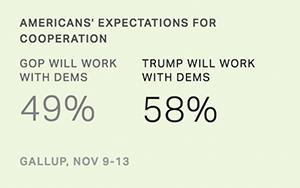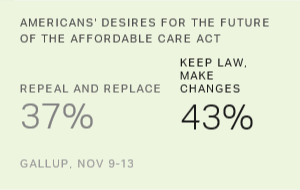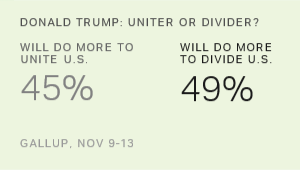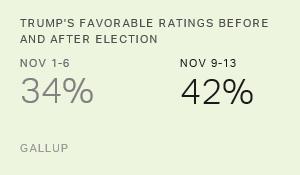Story Highlights
- 58% say Donald Trump and Democrats in Congress will try to cooperate
- 49% say Republicans in Congress will cooperate with Democrats
- Public was more optimistic about cooperation after Obama's 2008 election
PRINCETON, N.J. -- Although Republican President-elect Donald Trump will take office with his party in firm control of Congress, a majority of Americans (58%) are optimistic that he will make a sincere effort to work with Democrats to find solutions to the nation's problems. The same majority also believe that Democrats in Congress will sincerely try to work with Trump. Americans are less sure (49%) that Republicans in Congress will reach across the aisle.
| Yes | No | ||||||||||||||||||||||||||||||||||||||||||||||||||||||||||||||||||||||||||||||||||||||||||||||||||
|---|---|---|---|---|---|---|---|---|---|---|---|---|---|---|---|---|---|---|---|---|---|---|---|---|---|---|---|---|---|---|---|---|---|---|---|---|---|---|---|---|---|---|---|---|---|---|---|---|---|---|---|---|---|---|---|---|---|---|---|---|---|---|---|---|---|---|---|---|---|---|---|---|---|---|---|---|---|---|---|---|---|---|---|---|---|---|---|---|---|---|---|---|---|---|---|---|---|---|---|
| % | % | ||||||||||||||||||||||||||||||||||||||||||||||||||||||||||||||||||||||||||||||||||||||||||||||||||
| Trump will make sincere effort to work with Democrats in Congress | 58 | 40 | |||||||||||||||||||||||||||||||||||||||||||||||||||||||||||||||||||||||||||||||||||||||||||||||||
| Democrats in Congress will make sincere effort to work with Trump and Republicans | 58 | 39 | |||||||||||||||||||||||||||||||||||||||||||||||||||||||||||||||||||||||||||||||||||||||||||||||||
| Republicans in Congress will make sincere effort to work with Democrats | 49 | 49 | |||||||||||||||||||||||||||||||||||||||||||||||||||||||||||||||||||||||||||||||||||||||||||||||||
| Gallup, Nov 9-13, 2016 | |||||||||||||||||||||||||||||||||||||||||||||||||||||||||||||||||||||||||||||||||||||||||||||||||||
These results, from Gallup's Nov. 9-13 post-election survey, are updates to similar questions Gallup asked after the 2008 and 2012 elections. Americans were significantly more hopeful in 2008 about the possibilities of newly elected President Barack Obama than they are now about Trump. Eight in 10 Americans at the time expected Obama would cooperate with the opposing party in Congress. Like Trump, Obama had campaigned in 2008 on the need to bring about change -- but Obama was much better-liked after his election, with a 68% favorable rating, compared with Trump's post-election 42%.
After contending with a GOP-led House in 2011 and 2012, Obama in 2012 was less widely seen as able to work with the Republicans in Congress to find solutions. Even so, the 65% of Americans still saying this about Obama after his re-election was a bit more positive than Trump's current evaluation.
Although the political circumstances were different four years ago than they are now, just like today, Americans then gave more credit to the Democrats than to the Republicans in Congress for willingness to cooperate with the other party. Immediately after the 2008 election, however, the public was about equally optimistic about the potential cooperation of both parties' leaders.
| Yes | No | |||||||||||||||||||||||||||||||||||||||||||||||||||||||||||||||||||||||||||||||||||||||||||||||||||
|---|---|---|---|---|---|---|---|---|---|---|---|---|---|---|---|---|---|---|---|---|---|---|---|---|---|---|---|---|---|---|---|---|---|---|---|---|---|---|---|---|---|---|---|---|---|---|---|---|---|---|---|---|---|---|---|---|---|---|---|---|---|---|---|---|---|---|---|---|---|---|---|---|---|---|---|---|---|---|---|---|---|---|---|---|---|---|---|---|---|---|---|---|---|---|---|---|---|---|---|---|
| % | % | |||||||||||||||||||||||||||||||||||||||||||||||||||||||||||||||||||||||||||||||||||||||||||||||||||
| President will make sincere effort to work with opposing party in Congress | ||||||||||||||||||||||||||||||||||||||||||||||||||||||||||||||||||||||||||||||||||||||||||||||||||||
| 2016 (Trump) | 58 | 40 | ||||||||||||||||||||||||||||||||||||||||||||||||||||||||||||||||||||||||||||||||||||||||||||||||||
| 2012 (Obama) | 65 | 33 | ||||||||||||||||||||||||||||||||||||||||||||||||||||||||||||||||||||||||||||||||||||||||||||||||||
| 2008 (Obama) | 80 | 19 | ||||||||||||||||||||||||||||||||||||||||||||||||||||||||||||||||||||||||||||||||||||||||||||||||||
| Democrats in Congress will make sincere effort to work with opposing party | ||||||||||||||||||||||||||||||||||||||||||||||||||||||||||||||||||||||||||||||||||||||||||||||||||||
| 2016 | 58 | 39 | ||||||||||||||||||||||||||||||||||||||||||||||||||||||||||||||||||||||||||||||||||||||||||||||||||
| 2012 | 57 | 40 | ||||||||||||||||||||||||||||||||||||||||||||||||||||||||||||||||||||||||||||||||||||||||||||||||||
| 2008 | 59 | 40 | ||||||||||||||||||||||||||||||||||||||||||||||||||||||||||||||||||||||||||||||||||||||||||||||||||
| Republicans in Congress will make sincere effort to work with opposing party | ||||||||||||||||||||||||||||||||||||||||||||||||||||||||||||||||||||||||||||||||||||||||||||||||||||
| 2016 | 49 | 49 | ||||||||||||||||||||||||||||||||||||||||||||||||||||||||||||||||||||||||||||||||||||||||||||||||||
| 2012 | 48 | 48 | ||||||||||||||||||||||||||||||||||||||||||||||||||||||||||||||||||||||||||||||||||||||||||||||||||
| 2008 | 62 | 37 | ||||||||||||||||||||||||||||||||||||||||||||||||||||||||||||||||||||||||||||||||||||||||||||||||||
| Gallup | ||||||||||||||||||||||||||||||||||||||||||||||||||||||||||||||||||||||||||||||||||||||||||||||||||||
Implications
Although a record number of Americans believe the nation is divided after this election, Trump will enter office with fairly positive expectations that he will cooperate with Democrats in Congress and that Democrats will cooperate with him. Perhaps reflecting the political gridlock seen since the GOP took control of the House in 2011, Americans are less positive that GOP leaders will cooperate with Democrats.
Trump has the advantage of working with a Republican-controlled House and Senate, which should mean that he will be less at odds with Congress than has been the case for Obama over the past two years. Additionally, Trump can make a number of changes by implementing executive actions without congressional approval. But Democrats in Congress will still be needed for a number of actions on the Trump agenda to become law, meaning that cooperation between the two parties will continue to be important.
Previous Gallup research shows that Americans want their leaders in Washington to cooperate to get things done, including a significant percentage of rank-and-file Republicans who want compromise from their leaders. The likelihood of that occurring after the contentious 2016 election campaign is unknown, although Americans are somewhat optimistic that it will.
Historical data are available in Gallup Analytics.
Survey Methods
Results for this Gallup poll are based on telephone interviews conducted Nov. 9-13, 2016, with a random sample of 1,019 adults, aged 18 and older, living in all 50 U.S. states and the District of Columbia. For results based on the total sample of national adults, the margin of sampling error is ±4 percentage points at the 95% confidence level. All reported margins of sampling error include computed design effects for weighting.
Each sample of national adults includes a minimum quota of 60% cellphone respondents and 40% landline respondents, with additional minimum quotas by time zone within region. Landline and cellular telephone numbers are selected using random-digit-dial methods.
View complete question responses and trends.
Learn more about how the Gallup Poll Social Series works.




